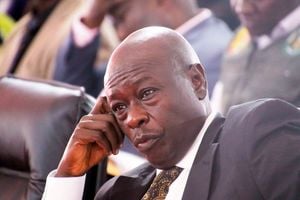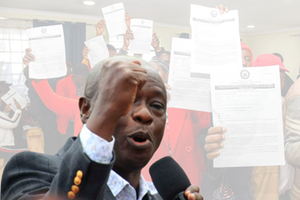‘Kuna Kuna’ and a nation’s itch

John Ogilo Migun, the Kisumu Assistant Chief whose dance video went viral shows the Nation team some of his moves during an interview at Xaverian Primary School. Photo/
A video of a concert a few days ago by Democratic Republic of Congo musician Innocent Balume, better known by his stage name Innoss'B, in a square in the eastern-central city of Kindu has been causing waves.
Innoss'B's music is good, but that video is being talked about not because of that. It is the massive crowd and how so swept up, immersed, and frenzied by Innoss'B it was.
It is a little frightening, and as one observer put it, any time it seemed there would be a disaster due to a lack of crowd safety measures. It didn't come to pass. Instead, it was hard to believe that anyone could have people in thrall to him as Innoss'B did at the concert.
Frightening but not impossible to understand. Music is often far more than music to Africans. And it has been so forever. These days, in a technological, urbanised, sceptical, and increasingly agnostic age when civilisation sometimes seems to be in decline, you would expect us to be less beholden to music. Instead, it is taking over our souls even more.
"Miondoko Chief"
During the holiday season at the end of 2022, Mr John Ogilo Migun, a sub-location chief in Kisumu, went to a popular bar and restaurant in the city after a work assignment. On came one of Kenya's 2022 hit songs, "Kuna Kuna" by Vic West, in which he collaborated with several other Kenyan artists, including Sauti Soul's Savara, Brandy Maina, the Exit band and Fathermo.
Migun jumped to his feet and, defying his ample size, made some deadly moves that Daily Nation later quoted him saying he learnt from Tik Tok. Unknown to him, someone recorded him and posted it on Tik Tok. Within a few weeks, a new and very unlikely star had been born. Migun became Kenya's New Year toast of the town.
"Kuna Kuna" capped a year in which quirky songs, and several rooted in the culture, as the African-Americans say, were the viral sensation. Perhaps none of them more so than "Vaida", sung in the Luhya vernacular by rookie artist Harry Richie. Its success ensured that he moved from rookie to big-ticket artist in just weeks.
"Kuna Kuna", "Vaida", their ilk, and Innoss'B's repertoire have one thing in common; they are happy songs. As cultural phenomena, they represent the remarkable skill of their creators to speak a language that transcends social and political divides.
In Kenya's case, we witness this growth of music as a national conversation and balm the more there is political polarisation and as various groups feel a greater sense of alienation and marginalisation.
We saw a notable moment of it on July 25, 2015, when then-US President Barack Obama visited Kenya, his first as an American leader, on his Africa tour.
Among the few regular Kenyans invited to a State House hosted in his honour by former President Uhuru Kenyatta was the music group Sauti Sol. One of the memorable photographs from the event was of Obama joining Sauti Sol to dance to their hit song "Sura Yako" after they challenged him to the floor. Sauti Sol was the one sure unsullied thing State House could present.
It had been an unusually bitter and acrimonious two years in Kenya, and the cloud was only beginning to lift. Kenyatta, and his deputy William Ruto, had spent 2014 in a bruising and divisive battle defending themselves against charges of crimes against humanity at the International Criminal Court (ICC) arising from the 2007/2008 post-election violence.
It was a battle that had drawn in all of Africa, with most African Union members souring on the international law order and threatening to walk away. At the start of December 2014, the ICC dropped the charges against Kenyatta, opening the door for the Obama visit seven months later.
Power of Sports
It's not just music. Sports is another critical bridge builder, national athletic achievement offering Kenya some of its big bipartisan moments, where all shades of politician opinions and prejudices make common cause to celebrate. Marathon victories around the world, the surprising javelin exploits of Julius Yego, and the near-super human long-distance-running feats of Eliud Kipchoge have been platforms for national elation.
But athletics also brings many moments of pain and shame, like the murder of 10,000 metres gold medallist Agnes Tirop and the many doping scandals. Also, the best of it takes place outside Kenya. Most Kenyans have seen Eliud Kipchoge run on TV, not in real life. And even fewer saw Yego in the flesh throwing a javelin.
Rugby seems to be the sport which has structured itself to enable Kenyans to feel they have permission to come together and be raw, let it all hang out, and express unapologetic patriotism. The big size of the players, the tackles, and the toil make for something akin to national participation in a benign victimless crime.
Rugby is how Kenyans fight and win their bloodless wars. Athletics is how they fly the national flag on a global stage. But music is a very different game. It is how they love their neighbours and soothe and scratch the many things that itch them.
Politics; is how they live their worst nightmares and confront their demons.
Mr Onyango-Obbo is a journalist, writer and curator of the "Wall of Great Africans". @cobbo3




